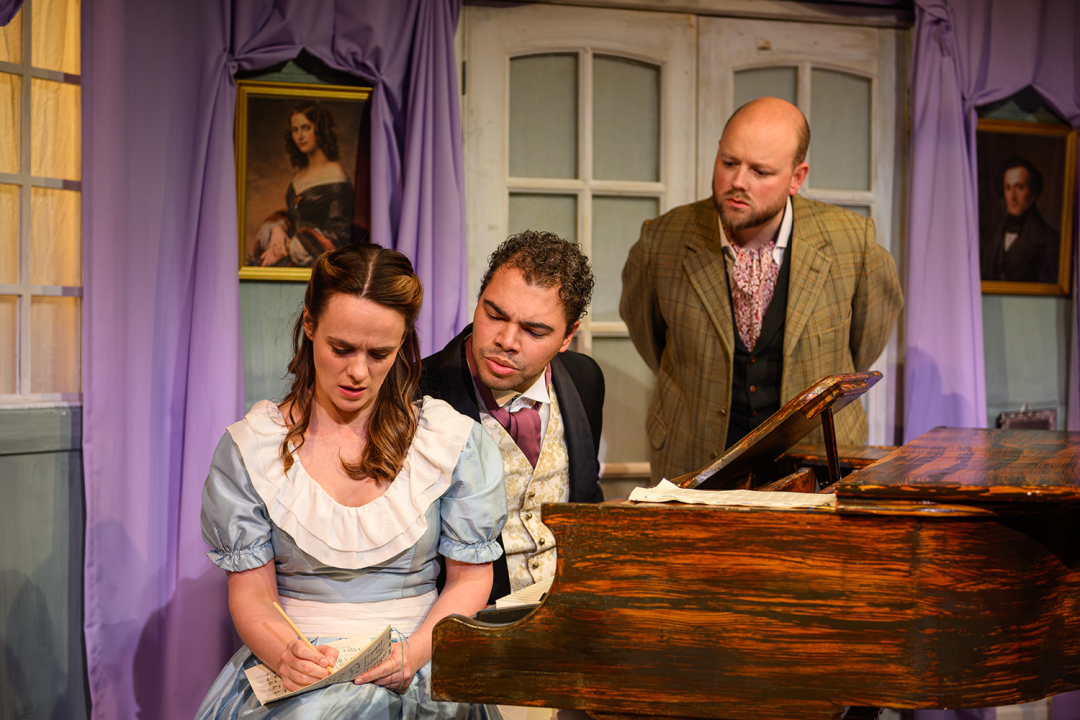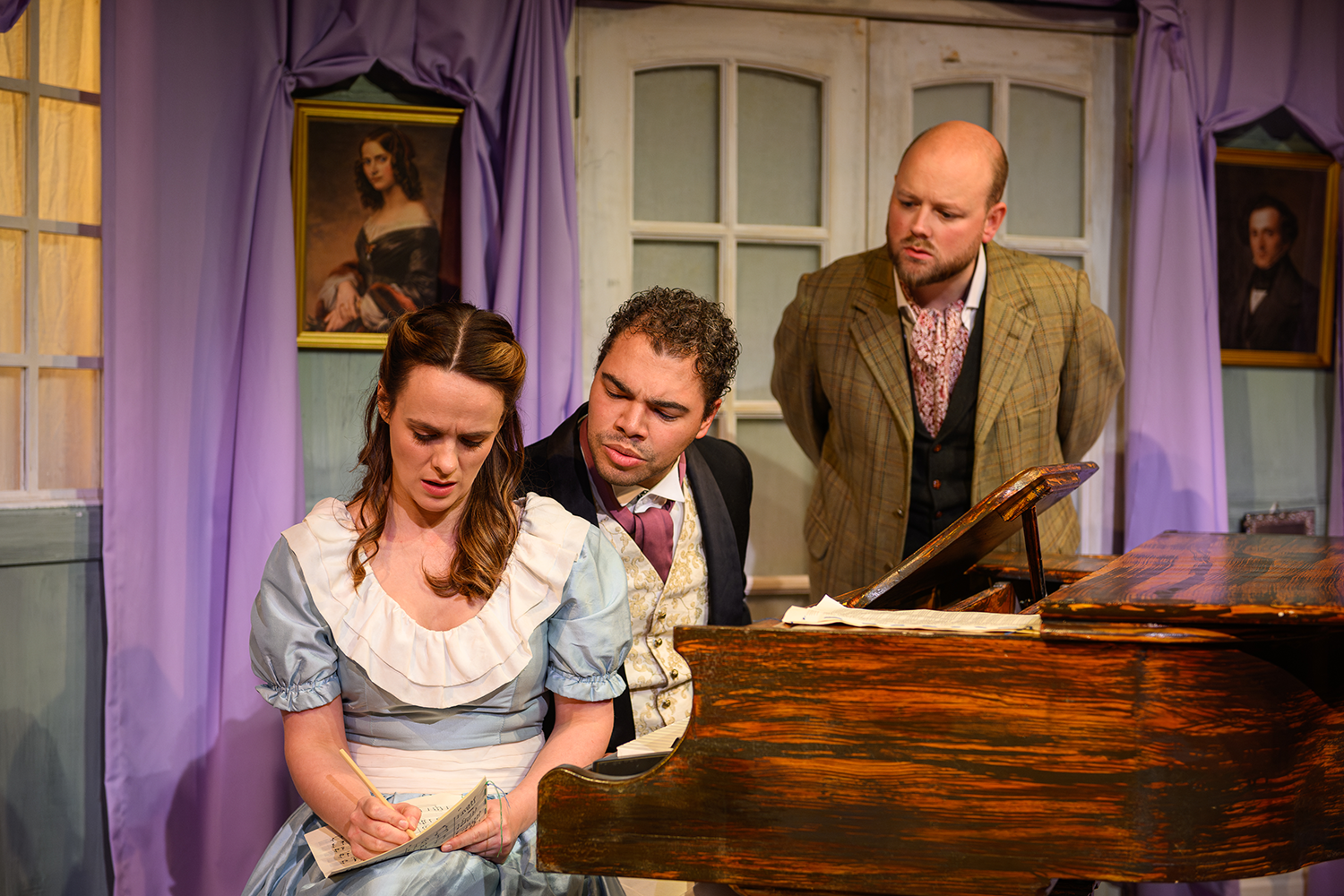
Da Vinci’s Laundry is based on an art world rumour. In 2017, Leonardo’s ‘Salvator Mundi’ sold at Christie’s for $450 million but some experts claimed that the attribution was inaccurate. Could the world’s costliest artwork be a fake? Writer, Keelan Kember, considers the provenance of a fictional Leonardo owned by a thuggish oligarch, Boris, who claims to have bought the masterpiece at a flea market. He invites two posh British experts, Christopher and Milly, to authenticate the painting and when Christopher questions its origins he earns Boris’s instant displeasure. Boris threatens to toss Christopher from the roof of his luxury mansion.
Enter a brash American, named Tony, who wants to buy the Leonardo on behalf of a rich Saudi clan. When the Saudis show up, heavily armed, the shooting starts and the blood flows. The plot turns into an amusing face-off between cartoon baddies. It’s great fun to watch, and Kember’s subtle, witty script moves along at quite a gallop. The stylish all-white set by Ellie Wintour manages to travel from a Russian mansion to a London hotel with the smallest of physical tweaks. A brilliant effort.
All the villains are easy to sympathise with. Boris, the evil Russian gangster, hopes to be accepted by English high society and he dreams of sending his son to a Chelsea prep school with tweed uniforms. Tony, the American loudmouth, worships Trump and declares that his greatest regret is ‘not storming the Capitol on January 6th’. Yet he has a heart of gold and he gives Milly wise advice about cultivating her love of Christopher.
For all its virtues, the show lacks the dazzle and the artistic purity of Kember’s last play, Thanks for Having Me, in which he starred. Here he takes on the minor role of Christopher and he allows Steve Zissis (brilliant as Tony) to steal the show. Perhaps this unbalances the production. The Christopher-Milly love affair ought to be placed at the heart of the story and not left dangling as an afterthought. Romance is a richer source of comedy than a battle over wealth or possessions. There’s an old axiom, ‘money ain’t funny’, which may be worth learning from.
Fanny, by Calum Finlay, is based on a historical footnote about Felix Mendelssohn’s older sister. Fanny was a gifted musician and composer who collaborated with her brother and supplied some of the music published under his name. One of her songs, ‘Italien’, caught the interest of Queen Victoria. The play follows Fanny’s attempts to publicise this secret and to claim her place as a professional composer on an equal footing with her brother.
Kember’s subtle, witty script moves along at quite a gallop
It opens with the talented Fanny conducting an imaginary orchestra at the family home in Germany. She’s interrupted by her nerdy brother and her bossy mother who bring news that a handsome artist, Wilhelm, wishes to marry her. The scene turns into a comic dissection of 19th-century etiquette. An unmarried woman such as Fanny was not allowed to travel alone, to take a job, to wear pockets or to appear in public without a ribbon in her hair. These restrictions had the effect of protecting women from ill-intentioned men but to modern eyes they look like tyranny. That’s the joke here. Why was 19th-century society full of bigots and weirdos?
Wilhelm arrives and instead of discussing art he makes endless puns while proposing to Fanny. Some of his jokes are ingenious, some less so. The couple run away to England and check into a hotel that bans females for unexplained reasons. This leads to more gags about the roles of men and women in the 19th century. When the couple reach London, they try to make contact with Queen Victoria and win her patronage.
But by now the story has changed radically. Felix, who at first felt unthreatened by his sister, has realised that she might eclipse his career and so he thwarts her attempts to reach Buckingham Palace. This leads to a satire on Hollywood car chases involving two horse-drawn carriages that speed through London and try to barge each other into the gutter. Good material but it goes on too long. And there’s an improv section in which Fanny turns the audience into an orchestra by getting them to sing, to stamp their feet and to ring hand-held bells. Again, hilarious. But it belongs in a comedy club. This story has a single theme: Fanny’s quest for artistic freedom. The addition of comic accessories weighs it down and makes it drag after about 120 minutes. Charlie Russell plays Fanny with an exquisite comic touch. She’s supported by Kim Ismay who impersonates various matriarchs with a gruff, self-mocking grace. These two are outstanding. So is Fanny’s younger sister, Rebecka (Danielle Phillips), who does little more than scream her head off whenever she enters a scene. Somehow she makes it funny every time.









Comments